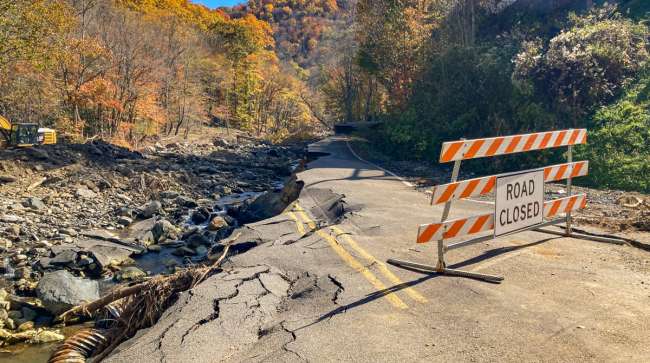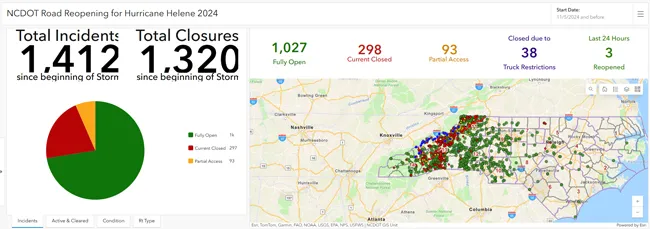Staff Reporter
North Carolina Deploys Surplus Goods to Aid Storm Recovery

[Stay on top of transportation news: Get TTNews in your inbox.]
Nearly two months after Hurricane Helene pulverized western counties, North Carolina Gov. Roy Cooper is waiving truck driver motor vehicle deadlines and freeing state surplus goods for needy areas as state workers grapple with 300 closed roads.
Cooper has issued two executive orders to aid recovery efforts: one on Nov. 1 to expedite distribution of state surplus property to affected areas, and another on Oct. 23 waiving various DMV fees and requirements through Dec. 31.
“Hurricane Helene caused immense damage to property owned by state and local governments, schools and nonprofits,” Cooper said. “This executive order [for state surplus goods] helps get them replacement property quickly and efficiently so they can continue with their missions.”
His mandate will speed up the process to help local government agencies and nonprofits obtain donated state surplus items to recover faster in the western part of the state that sustained the most significant damage from Hurricane Helene.
On Oct. 23, Cooper enacted an order for the Division of Motor Vehicles to temporarily suspend collecting some application and late fees as well as certain requirements for residents and businesses. Some waivers also apply to licenses for mechanics and businesses.
Cooper said numerous western North Carolina residents lost vehicles, licenses and other important documents after the hurricane, and several DMV facilities are still closed. The order prevents storm victims who cannot reach open DMV locations from facing additional financial burdens for replacement documents.

Cooper
“This action allows DMV to support disaster recovery by expediting the issuance of vital motorist records, identification and documentation while also providing relief for residents of impacted counties to restore some of their property,” the governor’s office stated.
DMV fee waivers for hurricane victims apply retroactively from Sept. 27 to Dec. 31 for duplicate driver licenses (including CDLs), duplicate or corrected vehicle titles, registration cards, salvage certificates and replacement license plates or stickers.
Other suspended DMV fees spanning past expirations on or after Aug. 31 are for: late vehicle registrations fees, late interest payments on vehicle registrations and property taxes, title fees and late fees for dealer plates. Also waived are late fees and interest on limited registration plates and vehicle registration renewals for limited registrations expiring on or after Sept. 30.
Refunds can be issued on late fees already paid by people in the 39 affected counties along with the Eastern Band of Cherokee Indians.
Cooper also suspended through Dec. 31:
- Duplicate title waiting period (usually 15 days)
- Safety and emissions inspections for vehicles registered in the western counties
- Licenses for safety and emissions mechanics requirements
- Motor vehicle dealer and sales representative licenses, and dealer license plates deadlines
- Dealer education requirements for dealer license renewals

The NCDOT road closure dashboard. (NCDOT)
As of Nov. 1, the North Carolina Department of Transportation had reopened 78% of 1,408 road closures following the hurricane. But the state continues to face significant transportation challenges, with nearly 300 roads completely closed, 93 with restricted access and 34 closed to commercial vehicle traffic.
“Numerous roads vital to the region’s economy have been reopened, including many primary routes and secondary roads like those used to access Christmas tree farms in Avery County,” NCDOT stated, adding it has identified 8,100 damage sites to roads, bridges and culverts.
At least 140 bridges are beyond repair and must be replaced. The number of destroyed bridges could rise as transportation crews remove storm debris, which reveals additional infrastructure destruction.
NCDOT has assigned 2,100 employees exclusively to recovery efforts, including transportation planners who are expediting construction contracts for repairs. In October, NCDOT awarded an $8.5 million contract to stabilize several thousand feet of westbound lanes of Interstate 40 in the Pigeon River Gorge that were damaged by river floodwaters. NCDOT has chosen a construction contractor to make permanent repairs to that section of I-40, which remains closed with an unknown date to reopen.

Hopkins
“Significant progress is being made because of the teamwork and long hours being put in by so many different organizations and individuals across North Carolina and beyond,” said Joey Hopkins, NCDOT secretary. “Restoring Western North Carolina will take a long time, but we’re grateful for all our partners who are helping get the region back on its feet.”
NCDOT has initiated dozens of emergency contracts for immediate repairs to flood- and debris-damaged roads, shoulders and bridges, while developing long-term contracts for major infrastructure reconstruction. The department’s primary focus remains restoring access to interstates, state and federal highways, and critical community connecting roads.
Want more news? Listen to today's daily briefing below or go here for more info:




